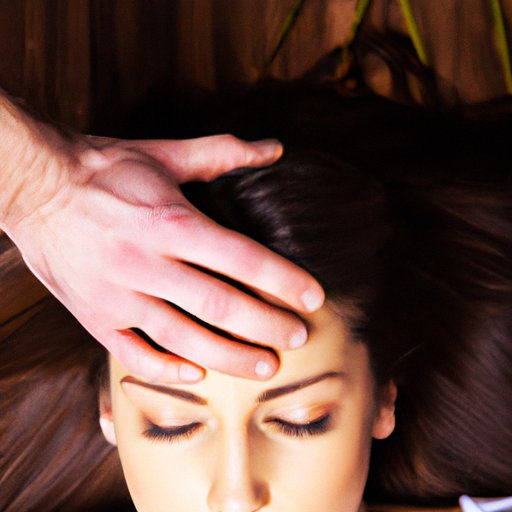
I. Introduction
Headaches are a common problem that many people experience on a regular basis. While over-the-counter painkillers can provide temporary relief, they are not always the best solution for long-term headache management. In this article, we will explore natural remedies for headaches that can help you find relief without relying on medication.
II. Lifestyle Changes to Relieve Headaches
One of the best ways to prevent headaches is to make lifestyle changes that promote overall health. Here are a few things you can do to help reduce the frequency and severity of headaches:
The Importance of Staying Hydrated
Dehydration is a common cause of headaches. To prevent headaches from occurring, make sure that you drink plenty of water throughout the day. Aim for at least eight glasses of water daily, and be sure to drink more if you are exercising or spending time in the sun.
The Benefits of Regular Sleep and Managing Stress
Lack of sleep and high levels of stress can also contribute to headaches. Make sure that you are getting enough sleep each night, and take steps to manage your stress levels. This may include practicing relaxation techniques like deep breathing or meditation.
The Impact of Diet on Headaches and Avoiding Trigger Foods
What you eat can have a big impact on your headache frequency and severity. Some people find that certain foods or ingredients trigger their headaches. Common culprits include processed foods, caffeine, alcohol, and MSG. Keeping a food diary can help you identify your personal trigger foods, and avoid them to reduce your headache risk.
III. Mindfulness and Meditation for Headaches
Mindfulness exercises like deep breathing, yoga, and meditation can help reduce stress and promote overall relaxation. These practices can be particularly helpful for people who experience tension headaches, which are often caused by muscle tension in the neck and shoulders.
Mindfulness Exercises to Try for Headache Relief
One of the simplest mindfulness exercises you can try for headache relief is deep breathing. Find a quiet place to sit or lie down, close your eyes, and take slow, deep breaths. Focus on the sensation of the air moving in and out of your body, and allow your mind to relax.
The Role of Meditation in Stress Reduction and Headache Relief
Meditation can help reduce stress and tension in the body, which can lead to a reduction in headaches. Try incorporating a daily meditation practice into your routine, even if it’s just for a few minutes at a time. There are many free meditation apps available that can help you get started.
IV. Massage Techniques for Headache Relief
Massage therapy can be a highly effective way to manage headaches, particularly for people who experience tension headaches. Studies have shown that massage can help reduce the frequency and intensity of headaches, and can also help improve sleep quality.
Self-Massage Techniques to Try at Home
There are many self-massage techniques you can try at home to help relieve headaches. One simple technique involves using your fingertips to apply pressure to the base of your skull, right where your neck muscles meet your skull. You can also try massaging your temples, or using a tennis ball to roll out tension in your neck and shoulders.
The Importance of Seeking Professional Massage Therapy for Chronic Headaches
If you experience chronic headaches, it’s important to seek out professional massage therapy. A licensed massage therapist can work with you to develop a treatment plan that addresses your specific needs and helps reduce your headache frequency and severity over time.
V. Yoga Poses for Headache Relief
Yoga is another great way to manage headaches and promote overall relaxation. Many yoga postures can help reduce tension in the neck and shoulders, which can help prevent tension headaches.
Yoga Postures to Try for Headache Relief
Some yoga postures that can be particularly helpful for people with headaches include child’s pose, downward facing dog, and seated forward bend. These postures help stretch and release tension in the neck and shoulders, promoting relaxation and reducing headache frequency and intensity.
The Importance of Proper Alignment and Seeking Instruction
When practicing yoga for headache relief, it’s important to focus on proper alignment and avoid pushing yourself too hard. If you are new to yoga, consider taking a beginner’s class or working with a qualified instructor to ensure that you are practicing safely and effectively.
VI. Natural Remedies for Headaches
There are many natural remedies that can help relieve headaches. Here are a few to consider:
The Benefits of Essential Oils for Headache Relief
Essential oils like lavender and peppermint can be highly effective for headache relief. Simply inhaling the scent of these oils can help reduce headache symptoms. You can also apply the oils topically by diluting them with a carrier oil and massaging them into your temples and neck.
The Use of Acupressure for Headache Relief
Acupressure involves applying pressure to specific points on the body to promote healing and relaxation. There are several acupressure points that are particularly effective for headache relief, including the space between your thumb and index finger, and the base of your skull.
Herbal Teas for Headache Relief
Many herbs have natural pain-relieving properties that can help reduce headache symptoms. Consider drinking herbal teas made from chamomile, ginger, or peppermint when you feel a headache coming on.
VII. Avoiding Headache Triggers
In addition to natural remedies, it’s important to identify and avoid common headache triggers. Some common triggers include bright lights, loud noises, and certain smells. If you notice that these triggers are causing your headaches, consider using alternative approaches like earplugs or dimming the lights to reduce your exposure.
VIII. Conclusion
Headaches can be a major problem for many people, but there are natural remedies available to help manage symptoms. By making lifestyle changes, practicing mindfulness and meditation, incorporating massage and yoga, and using natural remedies like essential oils and herbal teas, you can reduce your reliance on medication and promote overall health and well-being.





